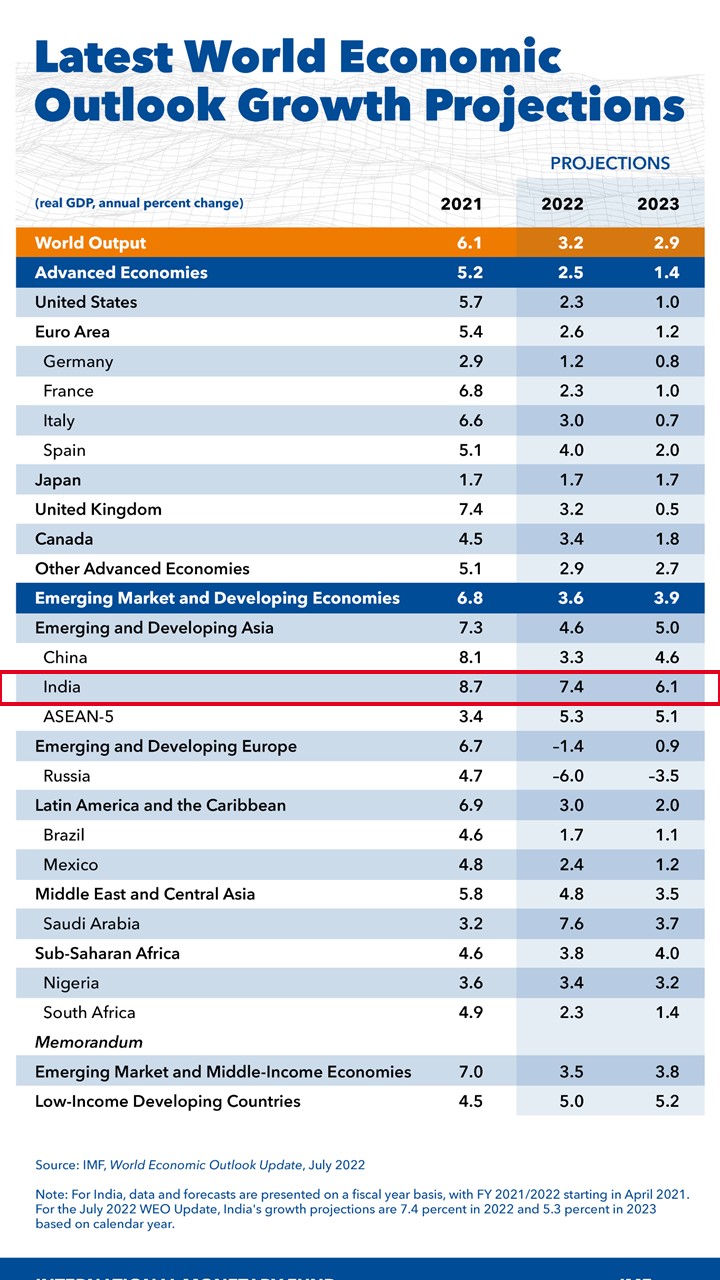Washington – A top International Monetary Fund (IMF) official said on Tuesday India is doing better and is in and in relative bright spot compared to other countries.
When everyone is slowing down in terms of economic growth, India has not remained unimpacted, but is doing better and is in a relatively bright spot compared to other countries, said Krishna Srinivasan, IMF Director of Asia and Pacific Department, in an interview with PTI.
Just look at the global conjuncture right now, which is the overarching problem, the growth was “slowing across many parts of the world even as inflation is rising”.
“We expect countries accounting for 1/3 of the global economy to go into a recession this year or the next. And inflation is rampant. So that is the overarching story.”
“Almost every country is slowing. In that context, India is doing better and is in a relative bright spot compared to the other countries in the region,” Srinivasan continued.
 The IMF on Tuesday in its World Economic Outlook projected a growth rate of 6.8 per cent in 2022 as compared to 8.7 per cent in 2021 for India.
The IMF on Tuesday in its World Economic Outlook projected a growth rate of 6.8 per cent in 2022 as compared to 8.7 per cent in 2021 for India.
The projection for 2023 slides down further to 6.1 per cent. More than a third of the global economy will contract in 2023, while the three largest economies -- the United States, the European Union, and China -- will continue to stall, it said.
"In short, the worst is yet to come, and for many people, 2023 will feel like a recession,” said Pierre-Olivier Gourinchas, the economic counsellor and the director of research of the IMF, in his forward to the WEO released during the annual meeting of the IMF and the World Bank.
Gourinchas said, there are three underlying headwinds. One, of course, is financial conditions tightening because central banks and Asian economies are tightening to address inflation.
Second is Ukraine, a war which has led to an increase in food and commodity prices, widening current account deficits. And the third is in the region itself, China is slowing down, he observed.
“What the RBI has done is that it's tightened monetary policy. Rightfully so. They have been in a proactive tightening monetary policy”, said Srinivasan
“Now, what that means is there has been a bearing on domestic demand. You have inflation, which affects consumer demand, and when you try to address inflation, that by tightening monetary policy, it will bear upon investment. And so, both for both reasons, you see some slowing in India, and that's why we revised it to 6.8 per cent this year and to 6.1 per cent the next year,” Srinivasan added.
According to Srinivasan, India has done phenomenally on digitalisation. “If you look at the digital public infrastructure in India, it's quite amazing.”
“About 70 per cent of the population is fully vaccinated. Vaccinating a country with 1.4 billion people is no easy task..By tackling the pandemic head-on, they have mitigated what could be an important headwind,” he said.
India is facing large pressures on the external account because oil prices have gone up. Current account deficits are widening.
Responding to a question, Srinivasan said there are certain reforms which need to be done from a longer-term perspective: agricultural reform, land reform, labour reform.
“They did go ahead with agricultural reform. It didn't kind of pan out, same thing with land reform. But these need to continue. You have to keep the momentum going all that will improve your business environment,” he said.
-PTI/TOI